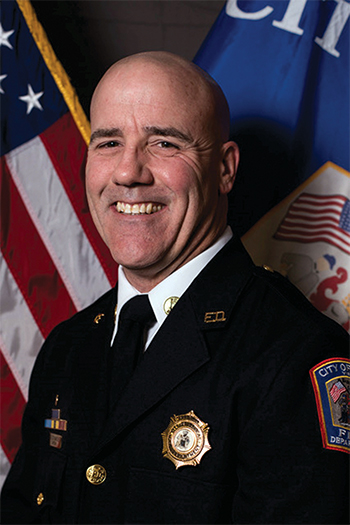Non-Hodgkin Lymphoma Survivor
Firefighter fought cancer and won

Diagnosed with testicular cancer and follicular lymphoma 17 years apart, Joe Schumacher credits “the big man upstairs” and his oncology teams for saving his life. Today, he is cancer-free and spends his time giving back by volunteering for the Firefighter Cancer Support Network and the Leukemia & Lymphoma Society.
People often think that firefighters die because of fighting fires. But, evidence shows that the majority of firefighter deaths are caused by cancer. Being a firefighter for 30 years, I understood a lot of the risks of this profession, but I didn’t expect to get cancer. Part of my life’s mission is to ensure that no firefighter should have to face cancer alone.
In 1996, my two-year old daughter ran into me in a man’s sensitive area. It hurt more than usual and continued to hurt for days. Two weeks later while seeing my doctor, I mentioned the pain in my testicle. He was concerned and ordered an ultrasound. After reviewing the results, he told me he suspected cancer but wouldn’t know for sure until I had surgery to take a closer look.
The surgeon found that I had Stage I non-seminoma testicular cancer that had encapsulated my right testicle. He removed the testicle and checked lymph nodes in the area. None were positive for cancer. I followed surgery with 17 radiation treatments to prevent a recurrence. After that, I was cancer-free until 2013 when while showering one morning, I noticed a lump on the left side of my groin.
When the lump didn’t go away within a week, I called my doctor. Thinking it was an infection, he gave me antibiotics and said to come back if there was no change in 10 days. There wasn’t, so I returned to him. He recommended I see a general surgeon and get an ultrasound. The surgeon performed a needle biopsy, and results showed I had a type of non-Hodgkin lymphoma. Further testing clarified it as Stage I follicular lymphoma. The good news was it had only been found in one lymph node, which was removed. I followed that with another 15 radiation therapy treatments, and today, I am cancer-free.
When I was diagnosed with the second cancer, I did what many people do and went to the internet. I learned that the number one type of cancer among firefighters is testicular cancer, and the incidences of non-Hodgkin lymphoma are higher for them than for the general population. I wanted to find someone I could talk to about this shocking information.
That’s when I found the Firefighters Cancer Support Network. Its mission is to assist firefighters and EMS providers and their immediate families facing a cancer diagnosis by offering badge-to-badge support, training and guidance. The group starts by providing newly diagnosed members with a blue tub full of hanging files to store all of the important information they will receive and a book about understanding cancer survivorship. The badge-to-badge support is the cornerstone of the organization. It pairs firefighters with other firefighters who have had the same type of cancer.
I wanted to help, so I joined the network. I served as assistant state director for Virginia before becoming the state director for Virginia. Today, I am the chief operating officer.
I retired from firefighting in 2018 and now focus on teaching other firefighters through the network on how to better protect themselves from the chemicals and carcinogens they could potentially be exposed to while working. I also volunteer and raise funding for the Leukemia & Lymphoma Society. Giving back feels good.
I know I am incredibly lucky to have survived both cancer diagnoses. I think the big man upstairs was looking out for me and guided me to the best physicians and nurses to treat me. I was also surrounded by the support of my family and friends. After the second diagnosis, the fire chief looked me in the eye and said, “Don’t worry about your job. Your priority is to get better.” I feel so lucky and blessed to have had this level of support.
When you are first diagnosed, remember that cancer is not an automatic death sentence. The science and treatments are continually improving. And, there are modifiable risk factors that you can control to reduce your chances of getting cancer. Some of these include eating healthy, using sunscreen, getting enough sleep and reducing your alcohol intake.
I ask trainees and experienced firefighters to think about making these choices and frame it in this context: What are your health and your life worth to you? Do you want to walk your daughter down the aisle some day or see your grandchildren? If so, these are the choices you have to make. Tomorrow is not guaranteed.
If you are a firefighter diagnosed with cancer and you are not sure whom to contact, reach out to the Firefighter Cancer Support Network at www.firefightercancersupport.org. They can give you the support you need – you do not have to go through cancer alone.


